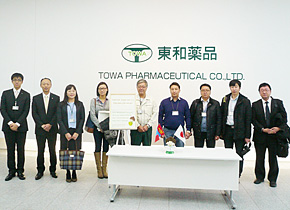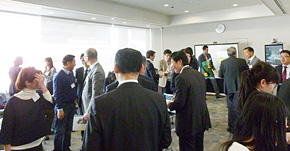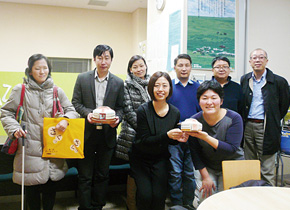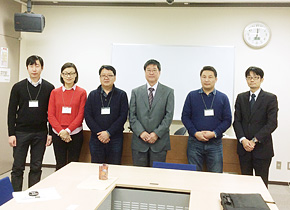A Mongolian network expanding throughout the Kansai region
PREX has implemented seminars in conjunction with Japan Centers in Central Asia for ASEAN countries. However, the holding of seminars in conjunction with the Mongolia-Japan Center was a first for us. Japanese specialists and Mongolian professors are employed at the center to give lectures mainly in the business courses. Training for lecturers is also being implemented, as we want to offer courses in line with the needs of the participants, by increasing the number of Mongolian lecturers with practical experience at local companies. After considering the purpose of the Mongolia-Japan Center, we created programs so that the participants, who are candidates to become lecturers, can acquire extensive learning.
Four Mongolian seminar participants arrived in Kansai on Dec. 7, 2014, on a flight from snowy Hokkaido. Kansai is home to a diverse concentration of small and medium-sized enterprises of great breadth. Amid intense competition, they ship their outstanding products within Japan and to the world. So we created the seminar program because we wanted to teach the excellent management that has come out of this dedication, and at the same time let people know that there are outstanding companies thinking seriously about Mongolia, as they take a serious look at the country.
Role of the Mongolian Consulate General
The backbone of the Mongolian network in Kansai is the Mongolian Consulate General in Osaka, which opened in 2012. “Mongolia has received help with Japan for a long time,” says the Mongolian Consul-General, Chonoi Kulanda. “Even now, Mongolians are coming to Japan almost every day to study.” In the most recent seminars, the participants visited three companies the Consulate told us about.
Towa Pharmaceutical contributes to the health of Mongolians
Towa Pharmaceutical Co., whose head office is in Kadoma City, Osaka Prefecture, was founded in 1951. I think many people know about the company for its TV commercials featuring Tetsuko Kuroyanagi. Towa has managed to expand its business by narrowing down its manufacturing and sales to generic pharmaceuticals, which are a type of ethical drug, and through product differentiation by offering drugs whose creative manufacturing makes medical professionals and patients happy.
Some of the company’s employees are Mongolians. She summarized the company to us in Mongolian. During an inspection of a factory, the seminar participants learned about the company’s policy of adding extra value by making the drugs easy to take for people of all age brackets, from children to the elderly, while also guaranteeing their efficacy and safety. The company would like to contribute to the health of Mongolians as much as possible, given the poor state of medicine in the country. It is already exporting drugs to Mongolia, although the company plans to have local manufacturing in the future, based on the philosophy of “local production for local consumption.” The seminar participants have expressed the importance of tie-ups with partners in Mongolia and their opinion that drugs for livestock, namely goats and sheep, are in demand.

Participants have their photo taken with both the Mongolian and Japanese flags at Towa Pharmaceutical Co.
A travel agency that plans tours of ‘Kaze Mongolia’
When thinking about Mongolia, many people probably imagine galloping around on a horse on wide grassy plains and living in a yurt. Bringing this image alive is “Kaze no Mongolia” tours from Kaze-travel Co. Its Osaka branch in the Umeda district was visited by seminar participants. The agency has staff who speak Mongolian proficiently. It is known for its original travel plans to such niche countries as Nepal, Kyrgyz and Guatemala. The “Windy Mongolia” tours started from former Mongolian employees returning to Ulan Bator and the establishment of Mongolian Kaze Travel. Around 14,000 Japanese people visit Mongolia each year, with many of them repeaters. The travel agency is mindful of the health of the horses it uses and is highly considerate of the environment, which features a nomadic lifestyle involving yurts. The company has also highlighted problems confronting modern Mongolia, such as a declining number of nomadic young people who can ride horses, a difficulty in finding Japanese-speaking guides and Ulan Bator’s severe traffic congestion. The seminar participants have offered their own ideas for local tourism, such as employing a Japanese chef to provide food made from Mongolian ingredients.
“There are fantastic assets that can’t be found elsewhere in Mongolia, such as open plains, horses and clear starry skies,” says the chairman of Fukujuen in Kyoto, which we visited in the latest seminar. “Please think about businesses that further utilize the strengths of your country.” The comment reminded the seminar participants, who live in the metropolis of Ulan Bator, of Mongolia’s charms as seen by Japanese people.
- Saying “cheese” in front of a booth of the Osaka branch of Kaze-travel, featuring a yurt.
A long relationship between Mongolia and Osaka Cashmere Co.
When talking about the network linking Kansai with Mongolia, we can’t forget Osaka Cashmere Co. The company’s dealings with the country go back to 1974, when it delivered cashmere carding machines to Mongolia. This was in the socialist era. It later established joint ventures in the course of importing raw cashmere and exporting machinery and parts. The company’s unparalleled technical strengths with machinery and equipment were created through long relations with Mongolia on the back of the country’s abundant raw cashmere and the demand for cashmere products in Japan. The seminar participants raised questions on the ease and difficulties in doing business with Mongolians. On one hand, they cited a passion for study, a high level of education and a talent for adopting things from outside. On the other hand, they mentioned a lack of a spirit of cooperation, taking action on their own, etc. Maybe it’s safe to say Osaka Cashmere has contributed the most to the Mongolian economy and shared the pains and pleasures with Mongolians for the longest period of time than any other Japanese company.
Osaka Gaidai produces human resources
Finally, a major contributor to Kansai’s Mongolian network has been the Mongolian language department of Osaka College of Foreign Studies (Osaka Gaidai: presently a faculty of Osaka University). One graduate of the department is Ryotaro Shiba. Research in Japan on Mongolia is said to be concentrated among three universities: Osaka Gaidai, Tokyo University of Foreign Studies and Tohoku University. Mongolians and Japanese people look exactly like each other. The person third from the right is Watanabe, an instructor, from Osaka Cashmere. We met lots of people from the university department in the latest seminar sessions. I’m sure that in the years to come, more outstanding human resources in research, education, business and a variety of other fields will emerge from the department. On Dec. 20, four seminar participants departed Kansai and headed home to Mongolia. In the latest seminar, they spent the first week in Hokkaido and then two weeks at work on the program in Kansai. During the company trips in Hokkaido, along with the essence of 5S, they learned about the imagination and creativity needed to conquer a set of unfavorable conditions in Hokkaido, such as contractors being thinly spread out, costliness of logistics in a large geographic area, and a severity of an outflux of human resources. I believe that after their return home, the participants will be very active in a variety of fields, in such places as the Japan Center, companies and consultancies, by utilizing the knowledge gained in Japan. I hope they don’t forget about the existence of the network, which takes serious consideration of Mongolia, in Kansai.

A forum to exchange opinions with companies based in Kansai
Gen Hamahashi, Satomi Okumura, International Department
Seminar summary
| Name | Mongolia-Japan Center Instructor Training Seminar |
| Period | Dec. 1-19, 2014 |
| Participants | 3 lecturer candidates for the Mongolia-Japan Center and 1 person responsible for a business course. |
| Sponsored and commissioned by | JICA Kansai |




